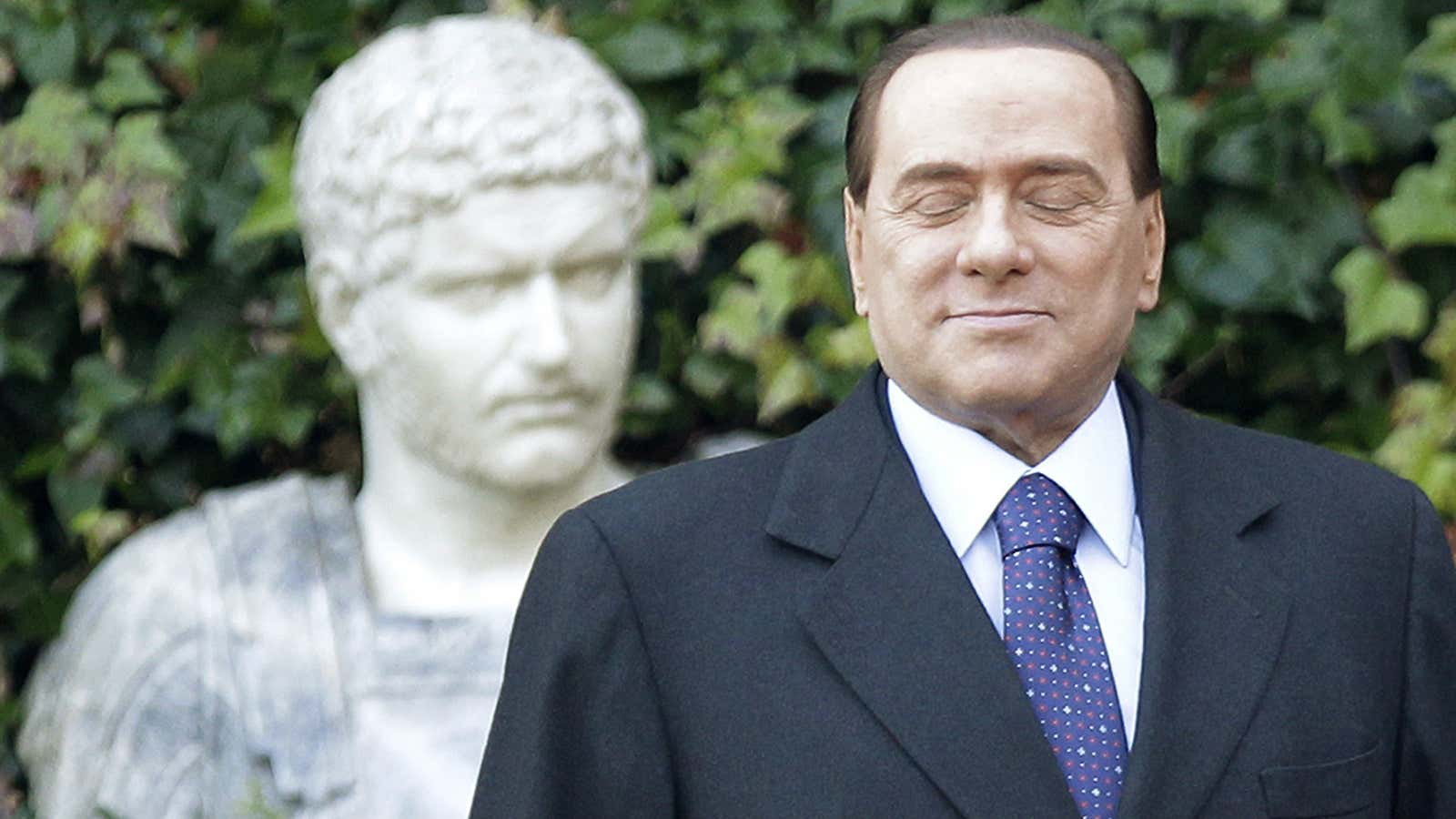Update (Dec. 8 at 11:00 a.m. ET): Silvio Berlusconi on Saturday confirmed his intention to run again for Italian prime minister, saying, “I return to politics with despair and out of a sense of responsibility…. I enter the race to win.”
Original post (Dec. 7 ): Oh, Silvio. The 76-year-old billionaire led a march by his center-right party out of the Italian senate on Dec. 6, after attacking Prime Minister Mario Monti’s economic policies. “The situation today is much worse than it was a year ago when I left the government out of a sense of responsibility and a love for my country,” Berlusconi blustered in a statement. “I cannot let my country fall into a recessive spiral without end. It’s not possible to go on like this.”
The move was more symbolic than anything else. It may hasten general elections, but only by a couple of months, to February. It’s unlikely to hold up major legislation, as there’s still time to pass a 2013 budget, even in the event of a snap election. Nor was it a proper show of no-confidence. On the same day of the walk-out, Berlusconi’s party said it wasn’t an attempt to bring down Monti’s government, but rather an expression of displeasure with policies. So you might ask, what was the point?
As usual, the motivations seemed more personal than anything else, and not particularly well thought out. If the markets were a chief concern, Berlusconi might have noted that Italian sovereign bond yields had recently fallen to a level erasing serious worry about the Italian economy. Instead, his shenanigans sent yields up 10 basis points.
Partly it’s about preparation for possible snap elections and setting the stage. For months, Berlusconi has been playing on popular discontent over aggressive austerity measures, though these have so far saved the country from bailout. More recently he’s stirred up speculation that he may run again for office after being “besieged by requests“.
But ironically, a Berlusconi candidacy—a reversal of an earlier pledge not to run again—could be just the thing that Italy needs to stay on course.
Monti was hauled in to run an emergency, non-partisan, technocratic government after Berlusconi was booted out of power for incompetence, and for driving up bond yields to unsustainable levels. Monti has managed in one year to restore credibility to Italian policymaking, says the Brookings Institution, while reversing a capital drain and helping return foreign investment. Still, over the past four years, the country has lost 30% of its industrial capacity, says Brookings, and if growth is not restored soon, the increasing debt-to-GDP ratio will put the country at serious risk. There are concerns that a new Italian government might fail to appreciate Brussels’ involvement in the nation’s fiscal affairs. And the country can’t afford more political and fiscal chaos in part because, as the euro zone’s third biggest economy, it is too big to be saved.
As a former European Commissioner, Monti gets both Brussels and Italian politics. Investors would breath a sign of relief if he stuck around, and he now says he will serve a second term (paywall) if no party gets an overall majority in the elections. And that is just what may happen if Berlusconi runs for office.
Political divisions are everywhere, including in Berlusconi’s own People of Freedom party. Even as its members appeared to pull support from the government, the party’s whip in the Senate, Maurizio Gasparri, backpedalled by saying it had ensured a minimum quorum (paywall) to pass legislation to stimulate economic growth and cut regional spending.
It’s not clear either who would lead the People of Freedom party. Angelino Alfano, the party’s secretary general, said yesterday it would be Berlusconi. But there’s internal strife over whether people charged with crimes should run for office, and Berlusconi is now a convicted fraudster following a trial in October. He’s intimated he could run on his own, further confusing matters.
In any case, Berlusconi’s is far behind in the polls. Leading them is the center-left Democratic Party, but even it would have to team up with smaller parties to form a government. It still stands by Monti (who is an independent), despite his declining approval ratings. Another centrist party could be headed by Monti.
Right now, though, it appears that chaos will reign with no clear winner emerging. That makes it possible that Monti could step in to see through the reforms he’s already started. It’s an outcome investors, Italians, and everyone in the euro zone really should cheer. And they’d have Berlusconi to thank.
